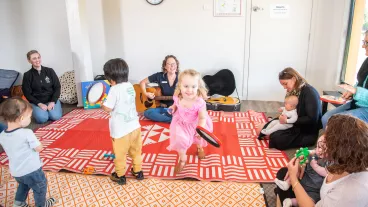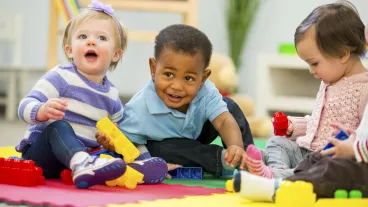The adaption of a national music therapy program for children and families during lockdown
December 2020
Jessica Higgins, Julia Oreopoulos
Children thrive when their parents or carers experience positive mental health and wellbeing; however, some families have faced increased obstacles to developing this protective health factor. The COVID-19 pandemic has added to the stressors faced by many families; increasing barriers to experiencing positive mental health and wellbeing and affecting families’ ability to foster a nurturing environment. In particular, lockdowns create additional challenges to accessing social services during a time of increased need. This short article outlines how one program adapted its service offering during lockdown to continue to support families.
What is the program?
Sing&Grow is an evidence-based music therapy program supporting young children and families to use music for building relationships, increasing community connection and facilitating childhood development outcomes. In partnership with family service sector host organisations, Sing&Grow provides 6–8 week group programs, family workshops, individual music therapy sessions and community engagement events. Through music-based play and reflective discussion, the program:
- builds caregiver capacity, awareness and confidence
- improves the quality of parent–child interactions
- enhances social connectedness
- improves children’s resilience, self-regulation, social skills and learning outcomes.
Research has shown that Sing&Grow improves parent mental health, parenting behaviours and children’s social and communication development.1,2,3
How did the program adapt?
In March 2020 during the national COVID-19 lockdown, Sing&Grow suspended all in-person services. To ensure support was available to families, the national team formed working groups to adapt its services. Privacy restrictions and internet and technology access meant online sessions were not suitable for all families and organisations. The national team worked in consultation with stakeholders to create alternative services that were responsive to varying levels of internet access, and varying levels of personal or organisational capacity to engage.
The national team:
- developed weekly content for Term 2, including live group and individual Zoom sessions, pre-recorded sessions, session booklets and links to other material
- launched a public Facebook page to disseminate some of this content and host a weekly public broadcast
- created closed Facebook groups for Communities for Children host programs to maintain relationships with these families and provide more targeted support
- created digital resource booklets and Craft&Sing videos to provide therapeutically informed activity ideas and information on how the activities support child development outcomes
- created and posted hard-copy booklets and instrument packs to families without access to the internet or technology.
During the second Victorian lockdown, Sing&Grow adapted the program again, creating music therapy informed videos, and refining the processes and content created during the national lockdown.
What were the results?
This operational evolution brought about unexpected positives for Sing&Grow, allowing staff to be more connected across Australia and to contribute meaningfully to overall program development.
Host organisation staff expressed appreciation for the high-quality material and the swift response to changes in service delivery. The pre-recorded material was also valued by many partner organisations who hosted Sing&Grow programs. They reported that an additional benefit of the pre-recorded material was that it also served as an introduction to Sing&Grow and helped establish new relationships with families who hadn’t previously engaged with support services. Sing&Grow clinicians reported that many parents used the video and booklet material and appreciated the extra ideas for activities to use flexibly at home. Families with complex needs often experience barriers to attending groups in person, so the adapted model allowed some families greater access to music therapy.
A main challenge with online sessions was the inability to do synchronised music making with all participants, due to audio delays. In response, our clinicians adapted with creative ways to engage families, including incorporating more turn-taking activities. The development and progression of social cohesion and a sense of rapport was also affected in some online groups. Inconsistent attendance was also noted, especially when restrictions began to ease and families were at home less.
Unexpected benefits have included a clinician-reported increase in turn-taking skills in children, as well as the reflection that it was easier to include more targeted educational components, as the online format required facilitation to be more therapist-directed. Clinicians also reported that smaller groups allowed for more targeted goals and increased the development of relationships with families.
What implications are there for future practice?
Pivoting and adapting services has provided a framework and an organisational confidence to continue to offer online music therapy programs for families, especially for families in remote areas where Sing&Grow has historically been unable to provide services. While face-to-face services still afford greater therapeutic benefits for most families, and will remain the core work of Sing&Grow, this new framework and resources also create opportunities for Sing&Grow to reach families who have been unable to access support due to financial, health or transport barriers.
Throughout both lockdowns in Victoria, we have observed that the gap has widened between families who are able to access support services and those who experience barriers to accessing support. Access to adequate technology and internet has emerged as one of the greatest barriers for families during lockdown and for the family services sector more broadly.
Best practice understandings on child participation from Emerging Minds, and feedback from host organisations and Sing&Grow clinicians highlight the importance of ongoing relationships and the need for frequent check-ins when providing online support to families. Further work is needed to understand how to best form therapeutic relationships with families via online methods, especially where no prior relationship exists.
References
1 Nicholson, J. M., Berthelsen, D., Abad, V., Williams, K., & Bradley, J. (2008). Impact of music therapy to promote positive parenting and child development. Journal of Health Psychology, 13(2), 226–238.
2 Nicholson, J. M., Berthelsen, D., Williams, K. E., & Abad, V. (2010). National study of an early parenting intervention: Implementation differences on parent and child outcomes. Parenting program implementation. Prevention Science, 11(4), 360–370.
3 Williams, K. E., Berthelsen, D., Nicholson, J., Walker, S., & Abad, V. (2012). The effectiveness of a short-term group music therapy intervention for parents who have a child with a disability. Journal of Music Therapy, 49(1), 23–44.
GettyImages/kohei_hara
Related publications

The impact of a music therapy program on parenting capacity…
This short article presents the results of Sing&Grow’s evaluation into impacts on caregiver capacity and child…
Read more
Helping children in care stay in contact with their birth…
This short article outlines how out-of-home care caseworkers can support contact between children and their birth…
Read more
Supported playgroups for parents and children
Defines the types of supported playgroups in operation in Australia, and assesses the evidence for their benefits for…
Read more